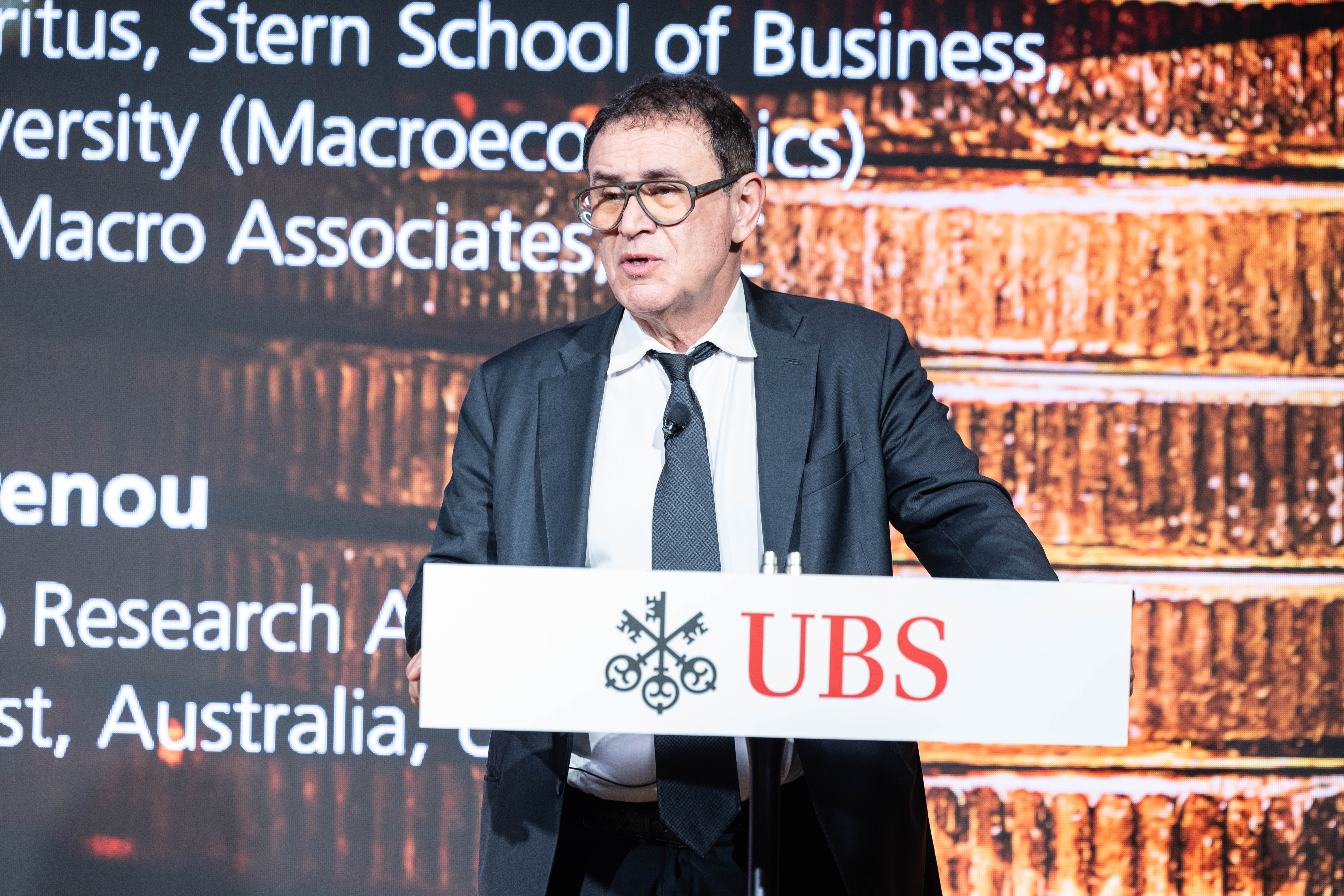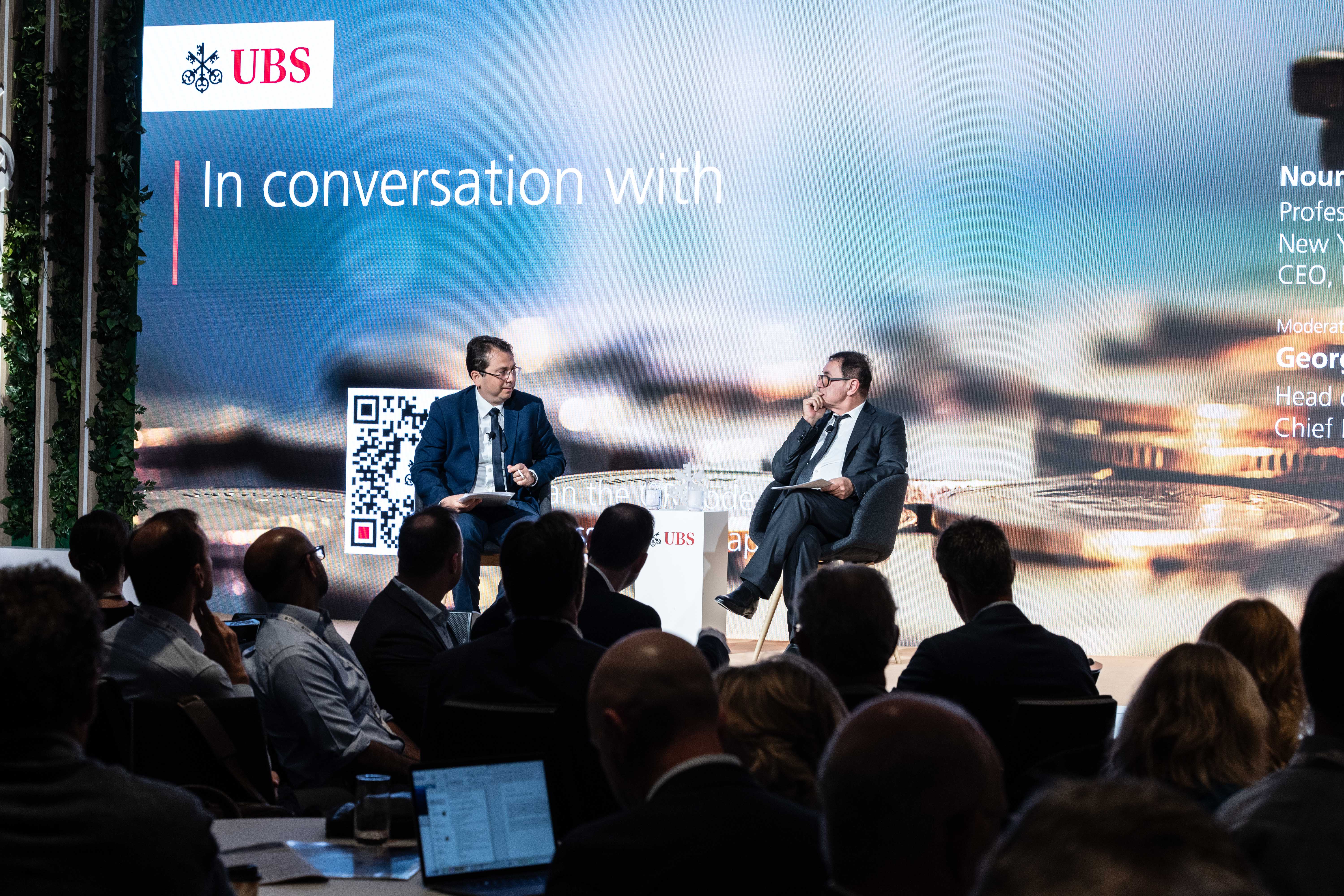Dr Doom: How Nouriel Roubini is thinking about markets in a 'polycrisis'
Depending on your worldview, there are either a few or a litany of crises affecting financial markets right now. From the resurgence of Trump to the debate on how to combat climate change to the question of how surging fiscal deficits will be contained and how Xi Jinping will deal with the structural challenges facing the Chinese economy. And that's before you get to the Middle East or Ukraine.
All of these are, in the view of Dr Nouriel Roubini, megathreats. In Roubini's words, investors are facing a "polycrisis" - or as he has put it - an "unusual, unexpected, unprecedented uncertain" environment. But just because there are many of them does not mean you can't prepare for them nor does it mean that there is unilaterally bad news everywhere you look.
Roubini, sometimes known by the moniker Dr Doom, presented in person at the UBS Australasia Conference this week. This wire will summarise his keynote address and highlight some of the Australian-relevant views he shared with UBS' Chief Economist for Australia, George Tharenou.
-42.jpg)
A brief overview of Dr Nouriel Roubini
Roubini is no stranger to economic forecasts - he's made boatloads of them. Here is a very brief summary of some of his more famous calls (both right and wrong:)
- In the summer of 2006, Roubini wrote that the U.S. was headed into a long and "protracted" recession due to the "collapse" of house prices
- In 2008, Roubini argued that the global economy had "a subprime financial system, not a subprime mortgage market." He went on to argue that "The bubbles and there were many, have only begun to burst."
- In October 2009, he predicted that the price of gold "can go above $1,000, but it can't move up 20-30%". (He was very wrong, incidentally)
- In May 2010, he predicted a 20% decline in the stock market. The S&P 500 actually rose about 20% over the following year (excluding dividends).
- In 2019, he wrote a prescient paper entitled "Nine reasons why stock markets are far too optimistic".
- On February 17, 2020, he warned of 'white swans' that "could trigger severe economic, financial, political, and geopolitical disturbances, unlike anything since the 2008 crisis." While he did not mention the coronavirus in his reasoning, the US stock market did peak two days later. He went on to suggest the US stock market rally in the aftermath of COVID's global outbreak would fizzle.
Quite a cheerful man, huh?
So what does Roubini say now?
Let's start with the largest and most recent elephant in the room - the re-election of Donald Trump and how his "Tariff Man" approach will likely affect markets.
"The interaction between these two economies is going to become more complex from trade wars, tariffs, or an all-out economic war. He has said that he wants to impose tariffs of 60% on Chinese goods and 10-20% on all other nations, even from friends and allies," Roubini said.
"If we have massive tariffs and trade wars, if we see massive restrictions to migration, if we have budget deficits that are unfunded, and if we see central banks that are less independent, that will have a significant impact on economic growth over time."
He went on to argue that other contributors to the situation we are now in include the zero-interest rate era and hyperglobalisation. But what does this mean for markets?
"The [US] Dollar is going to remain stronger because the US [economy] is going above potential. The Fed is going to accept slightly higher than 2% inflation because they don't want to kill the recovery. But the policies of Trump are going to be a risk for Europe, for Asia, and for Australia," Roubini added.
All this equates to more savage interest rate cuts from most central banks, including Australia, while the US Federal Reserve will likely ease rates less significantly. For financial markets, if these radical economic policy shifts lead to high inflation and unsustainable fiscal deficits, Roubini argues markets will correct itself.
"Eventually, the stock market is going to correct and the bond vigilantes will force him to make a policy reversal and go towards a much more moderate economic policy," Roubini said.
"The good news is that if nothing else, market discipline can put some discipline on the more erratic and unorthodox economic beliefs," he added.
One of the reasons markets are vulnerable to deep and serious corrections is the state of government spending - something economists call the "fiscal deficit" or the "fiscal cliff". One of Trump's key messages has been one of pro-business and making his first-era tax cuts a more permanent feature of life. But Roubini says these policies will likely create an explosion in the fiscal deficit and push up inflation and real rates. If that happens, watch how markets react.
"The deficit will explode above US$2 trillion and then bond yields will go through the roof. He [Trump] cares about the bond market. He wants borrowing costs to be cheap and he cares about the stock market because it's a signal to him that his economy is successful. If bond yields were to go well above 5%, the stock market would correct given policies would appear stagflationary," Roubini notes.
Watch the US 10-Year Yield

In China, the economy's structural problems will need to be met with change. But how drastic those changes may be is what specifically keeps Roubini up at night.
"I worry that a radical regime shift that implies dealing with excess savings and trying to dump excess capacity is not going to happen until, perhaps, protectionism forces them to do something else."
"Before COVID, China had been growing at about 10% for three decades. Right before COVID, that slowed down to around 7%. After COVID, Chinese growth is now barely 5%. If you look at the potential growth for China, maybe it will hit only 3%," he added.
And if Trump wants a trade war (or even a full-fledged "economic war") with China, then the Chinese government will need to make dramatic changes.
"If Trump is really serious about tariffs and an economic war against China, the model of growth based on increasing supply but not increasing domestic demand just won't work. For now, they are resisting [change]," Roubini argued.
Related to this, Roubini noted that commodity prices fell by 60% between 2010 and 2020 due to the weak post-GFC economic recovery. This decline was exacerbated during the COVID-19 pandemic. But he says it's not all bad.
"That may be good news for countries that are commodity exporters like Australia," Roubini argued but did not elaborate further as to why.
-5.jpg)
Why has Roubini been wrong on a massive recession until now?
As recently as November 2023, Roubini was quoted as saying we were in a "mega-threatened age" where a "bloodbath" threatens to wipe out investors' gains. He even extended this call to non-investors:
“There is growing recognition that not only the global economy but also human survival is at risk," Roubini wrote in an NYU Stern note.
But this has not materialised - far from it. When Roubini reflected on why he has been wrong until now, he doesn't give all the credit to the consumer much like most economists tend to.
"I think part of it was luck and part of it was good economic policy," Roubini offered.
"The three negative aggregate supply shocks that occurred during COVID which would have reduced growth and increased inflation were reversed," he said.
The shocks were: the supply of labour, goods, and services through supply chains, the Russian invasion of Ukraine, and finally, China's zero-COVID policy.
The next signposts for investors
1. Who does Trump put in to execute his vision?
Will they be serious about bringing down inflation? Will they look to deliberately interfere with the independence of the Fed? Will they pass on those tax cuts without financing them?
2. How much will they spend to achieve these goals?
The combination of the Trump administration's policy promises implies that public debt will grow by as much as US$8 trillion over the next 10 years. This, if it occurs, may lead to the weakening of the US Dollar (both in markets and in its status as the world's reserve currency) and soaring bond yields.
3. Will the US 10-Year yield hit 5%?
If the 10-year yield hits 5% stateside, Roubini said we may see a significant correction for financial assets and the Fed may have to stop cutting rates. In fact, they may even have to raise interest rates.
If, however, the Trump administration puts more moderate policies into place, then it will lead to a much more benign scenario that supports the economy and financial markets.
4. Trump may want a weaker US dollar but a tariff policy implies a stronger dollar.
In other words, he is going to have to make a choice.
4 topics

